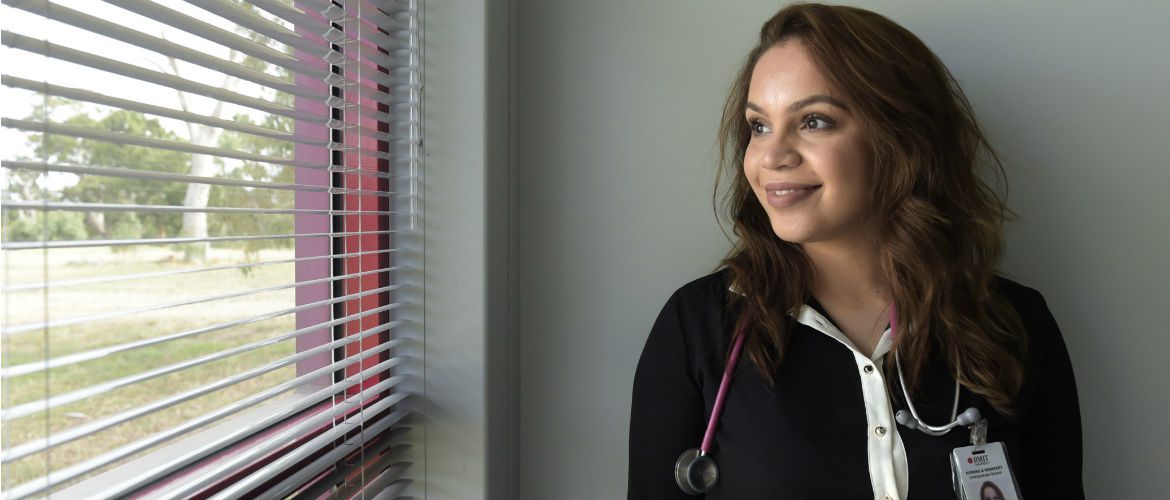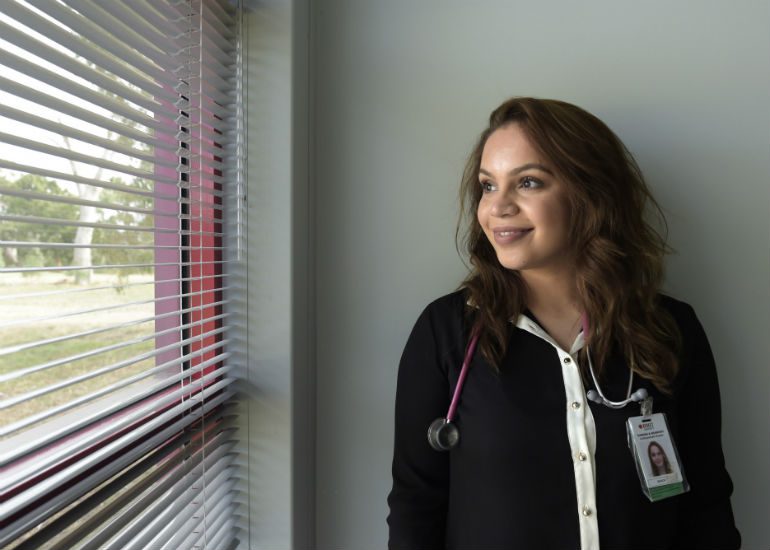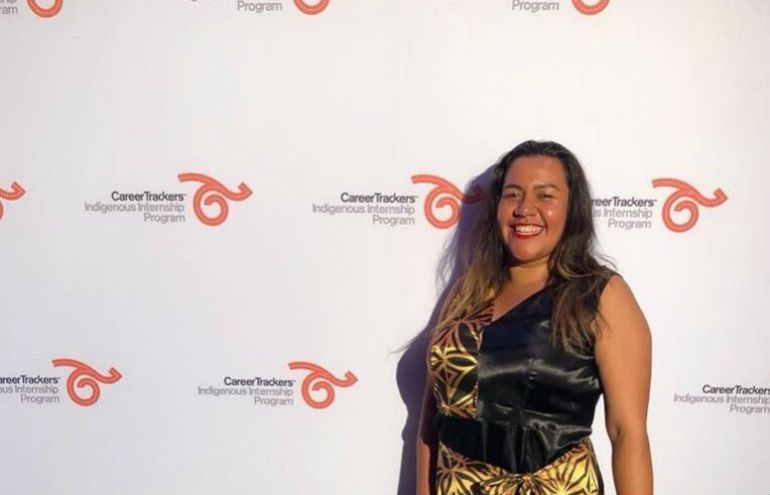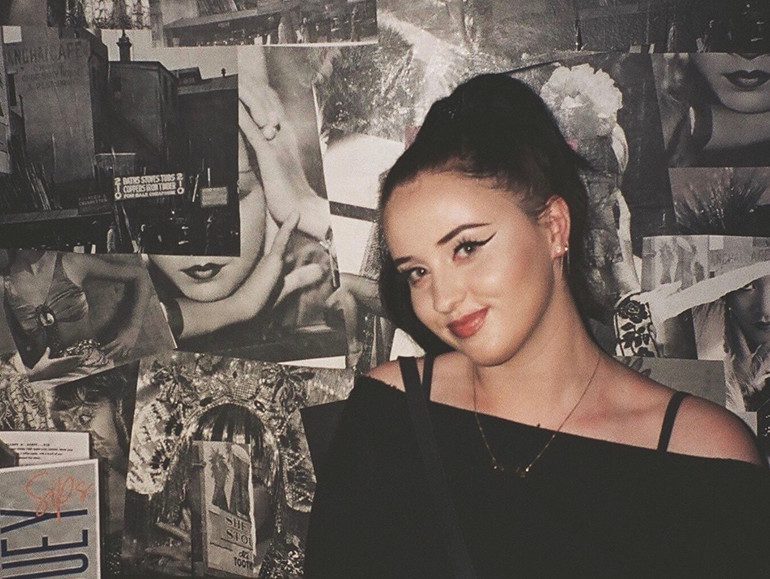
National Close the Gap Day is only a few days away on 15 March 2018. With International Women’s Day still fresh in our minds, we ask three inspiring young women to express in their own words why we must close the gap in Indigenous health.
Banok Rind
Banok Rind is a proud Yamatji-Badimia woman from Western Australia. A teacher once told Banok she would not succeed in school because she was Aboriginal. But Banok defied racism and proved her teacher wrong. She graduated Year 12 and completed a Bachelor of Nursing from RMIT University. She is now a registered nurse, and an ambassador for the Close the Gap campaign.

On 8 February, Banok addressed political leaders including Malcolm Turnbull, Bill Shorten and Richard Di Natale at Parliament House in Canberra. This is an edited extract of her speech:
“I am a strong Aboriginal woman. I am a strong Aboriginal nurse. I am passionate about our people’s health. But I am passionate because I am concerned for our people’s health.
“Working in the health field wasn’t a choice I made. Rather, it was a decision I needed to make. Our people are sick. Our babies are sick. Our people are unwell.
“Before colonisation, thousands of years ago, the sicknesses we had were treatable through our own traditional bush medicines. In my Badimia language, we call this Guruma. But today, our people live 11.7 years less than non-Indigenous people. Why is that? My grandfather lived until he was 58. All of my father’s 13 siblings had or have diabetes, heart-related diseases, renal diseases – to name a few. Growing up, I thought it was normal to see a lot of my elders, aunties and uncles sick. Many members in my own family have passed on from illnesses that were preventable.
“You know what I see in 10 years’ time in Aboriginal health? I see our young ones paving the way for future generations. I see our elders strong and healthy, passing on their knowledge and ways with ease, not with illness and disease. I see our beautiful culture embedded in the way our health services will function. The gap will be non-existent, with more community-controlled health services with a majority Indigenous health staff.
“This foreseeable future can only be achieved if our voices are listened to and heard. Listening to us means eliminating this spoken or unspoken superiority complex and acknowledging that we, Aboriginal and Torres Strait Islander people know what’s best for OUR people. We need more Aboriginal and Torres Strait Islander people across all fields, but especially health.”
Tjarani Barton-Vaofanua
Tjarani Barton-Vaofanua is a proud Aboriginal, Samoan and Hungarian woman from Sydney. A student, intern, communications worker and radio presenter, education and job training has empowered Tjarani to achieve her goals. Here, Tjarani tells her story.

“I am a proud Aboriginal, Samoan and Hungarian woman. I come from the Wakka Wakka and Woolwonga nations.
“I am currently studying a Bachelor of Communications and International Studies (Production & German) at the University of Technology Sydney. I also recently completed the CareerTrackers Internship Program. CareerTrackers creates opportunities for long-term paid internships for Aboriginal and Torres Strait Islander students. The first company I interned in was BBC Worldwide, where I began my communications career for over two years. After leaving the BBC, I interned for Oxfam Australia on the Close the Gap campaign. I will never forget working with the Oxfam team. They welcomed me in and had me working in amazing projects right from the start!
“CareerTrackers not only partnered me with this company, but they developed my skills to allow me to enter a corporate workspace. Previously I had never worked in a corporate environment, nor had I been professionally interviewed. CareerTrackers assisted me with writing my CV, interview preparation and presentation, and once I had received the offer of employment, they assisted me with the transition into a new workplace.
“Not only have CareerTrackers given me a head start in my career, but they have given me the opportunity to be a role model to my younger brothers and cousins. Through this program, I have shown my family and community that we can achieve anything we set our minds to.”
She finishing the CareerTrackers program, Tjarani has since been employed by Aboriginal Housing Australia as a Communications Officer, and is a Breakfast Presenter on Koori Radio. Tjarani provides a shining example of using one’s educational opportunities to give back to the community.
Yasmin Johnson
University student Yasmin Johnson volunteers for Oxfam Australia on the Close the Gap campaign. Here, Yasmin explains what inspired her to volunteer for Oxfam on the Close the Gap campaign.

“When I was in high school, I learned about Indigenous inclusion and exclusion through the HSC subject ‘Society and Culture’. This subject really opened my eyes up to the sheer scale of Indigenous disadvantage in many parts of Australia, and in many areas of society including in education, health, housing, employment and the justice system. This subject really ignited my passion for social justice, social change and social equality.
“Inspired by my learning, I began volunteering for Oxfam Australia, working on the Close the Gap campaign. My favourite memory so far has been meeting the other volunteers who are also working on this campaign. We recently discovered we had all studied ‘Society and Culture’ in high school, and were inspired by the subject to fight for social justice.
“As someone fortunate enough not to experience health inequality, I believe it is very important to campaign and promote change for those in our country who do experience this disadvantage. Access to health care is a fundamental right enshrined in human rights legislation, yet this right is not fully extended to so many Indigenous people. In a country as advanced as Australia, more people should be informed on the reality for Australia’s First Peoples. We must demand an improvement to their ailing health standards.”
Register your school’s event for National Close the Gap Day on 15th March 2018 here:
REGISTER HERE
Participate in our Schools Instagram Challenge here:
CLICK HERE
Download the Student Resource Kit here:
DOWNLOAD HERE